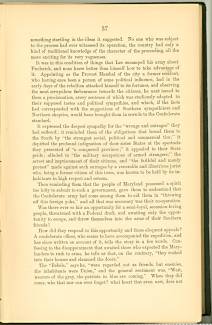Collection Name
About
something startling in the ideas it suggested. No one who was subject to the process had ever witnessed its operation, the country had only a kind of traditional knowledge of the character of the proceeding, all the more exciting for its very vagueness.
It was in this condition of things that Lee encamped his army about Frederick, and none knew better than himself how to take advantage of it. Appointing as the Provost Marshal of the city a former resident, who having once been a person of some political influence, had in the early days of the rebellion attached himself to its fortunes, and observing the most scrupulous forbearance towards the citizens, he next issued to them a proclamation, every sentence of which was studiously adapted to their supposed tastes and political sympathies, and which, if the facts had corresponded with the suggestions of Southern sympathizers and Northern skeptics, would have brought them in crowds to the Confederate standard.
It expressed the deepest sympathy for the "wrongs and outrages" they had suffered; it reminded them of the obligations that bound them to the South by "the strongest social, political and commercial ties;" it depicted the profound indignation of their sister States at the spectacle they presented of "a conquered province;" it appealed to their State pride; alluded to "the military usurpations of armed strangers;" the arrest and imprisonment of their citizens, and "the faithful and manly protest" made against such outrages by a venerable and illustrious jurist who, being a former citizen of this town, was known to be held by its inhabitants in high respect and esteem.
Then reminding them that the people of Maryland possessed a spirit too lofty to submit to such a government, gave them to understand that the Confederate army had come among them to aid them in "throwing off this foreign yoke," and all that was necessary was their co-operation.
Was there ever so fair an opportunity for a semi-loyal, secession-loving people, threatened with a Federal draft, and awaiting only the opportunity to escape, and throw themselves into the arms of their Southern friends !
How did they respond to this opportunity and these eloquent appeals? A confederate officer, who seems to have accompanied the expedition, and has since written an account of it, tells the story in a few words. Confessing to the disappointment that awaited those who expected the Marylanders to rush to arms, he tells us that, on the contrary, "they rushed into their houses and slammed the doors."
The "Rebels," says he, "were regarded not as friends, but enemies, the inhabitants were Union," and the general sentiment was, "Wait, wearers of the gray, the patriots in blue are coming," When they did come, who that saw can ever forget ? what heart that even now, does not
